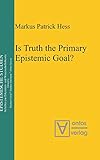Is Truth the Primary Epistemic Goal? / Markus Patrick Hess.
Material type: TextSeries: Epistemische Studien / Epistemic Studies : Philosophy of Science, Cognition and Mind ; 17Publisher: Berlin ; Boston : De Gruyter, [2013]Copyright date: ©2010Description: 1 online resource (165 p.)Content type:
TextSeries: Epistemische Studien / Epistemic Studies : Philosophy of Science, Cognition and Mind ; 17Publisher: Berlin ; Boston : De Gruyter, [2013]Copyright date: ©2010Description: 1 online resource (165 p.)Content type: - 9783110329384
- 9783110329551
- 121
- BD171 .H47 2010
- online - DeGruyter
- Issued also in print.
| Item type | Current library | Call number | URL | Status | Notes | Barcode | |
|---|---|---|---|---|---|---|---|
 eBook
eBook
|
Biblioteca "Angelicum" Pont. Univ. S.Tommaso d'Aquino Nuvola online | online - DeGruyter (Browse shelf(Opens below)) | Online access | Not for loan (Accesso limitato) | Accesso per gli utenti autorizzati / Access for authorized users | (dgr)9783110329551 |
Frontmatter -- Table of Contents -- Acknowledgments: -- 1. Introduction -- 2. Can Truth Be an Epistemic Goal? -- 3. The Value of Truth -- 4. Requirements of the Truth Goal -- 5. The Primacy of the Truth Goal -- 6. Alternative Monism -- 7. The Value of Knowledge -- 8. Conclusion -- 9. Appendix: Overcoming the Problem of Epistemic Relativism -- Bibliography
restricted access online access with authorization star
http://purl.org/coar/access_right/c_16ec
This book is focused on a problem that has aroused the most controversy in recent epistemological debate, which is whether the truth can or cannot be the fundamental epistemic goal. Traditional epistemology has presupposed the centrality of truth without giving a deeper analysis. To epistemic value pluralists, the claim that truth is the fundamental value seems unjustified. Their central judgement is that we can be in a situation where we do not attain truth but something else that is also epistemically valuable. In contrast, epistemic value monists are committed to the view that one can only attain something of epistemic value by attaining truth. It was necessary to rethink the long-accepted platitude that truth is our primary epistemic goal, once several objections about epistemic value were formulated. The whole debate is instructive for understanding how the epistemic value domain is structured.
Issued also in print.
Mode of access: Internet via World Wide Web.
In English.
Description based on online resource; title from PDF title page (publisher's Web site, viewed 28. Feb 2023)


